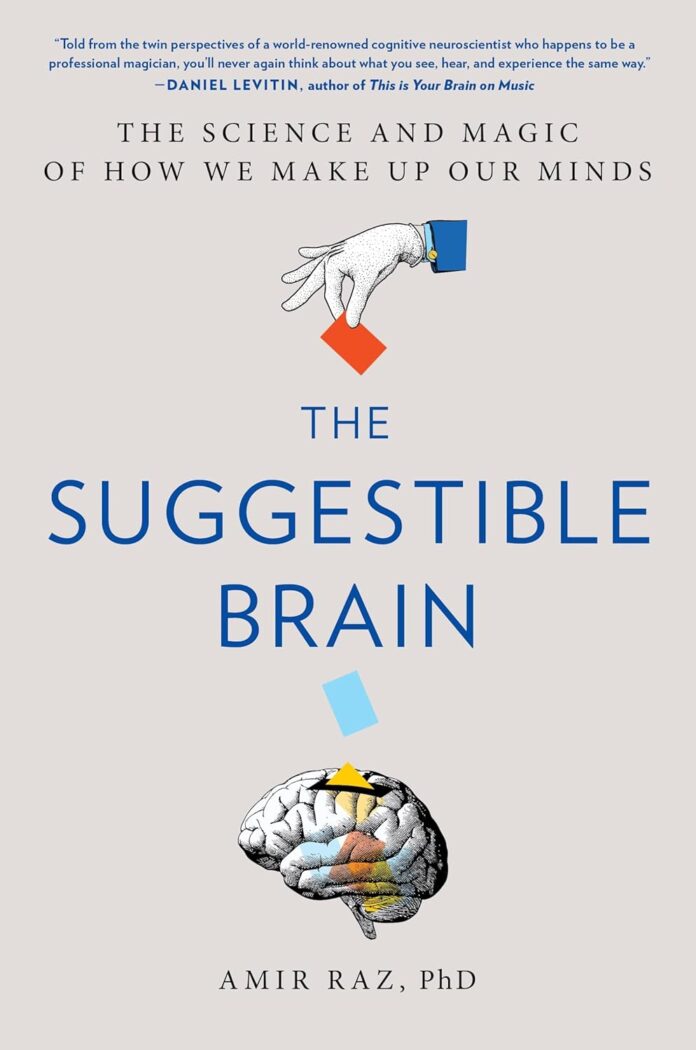The Suggestible Brain tells the Science and Magic of How We Make Up Our Minds. A sugar pill can alleviate your pain and aches or cause you to recall vividly the incidents that didn’t happen in the first place. The answer is in a single factor, that is, suggestion.
If you’re aware of that, whether you realise it or not, your actions are suggesting. Every subtle (and sometimes, not so-subtle) suggestion affects your perception of the world, your feelings and even the things you consider to be truthful. When you understand the science behind suggestions, you will be able to protect yourself from exploitation and, more importantly, use suggestions to enhance your life.
In this summary, you’ll learn the ways that suggestibility has shaped the evolution of mankind and how it can help explain everything from the Salem Witch trials through modern-day campaigning for elections and how it can be utilised to treat ailments like anxiety and depression. In addition, you’ll discover how to harness your own personal suggestions to improve your life and be an influential influence on those who surround you.
Are you ready to discover these secrets to reveal this undiscovered force? Let’s get started.
Decoding Suggestions and Suggestibility
It’s first important to decode two closely linked concepts: suggestibility and suggestion.
They’re similar in sound. However, there’s a subtle distinction. A suggestion is a type of suggestion, similar to a nudge, that seeks to influence your thinking or emotions or to suggest that you are aware of something that is true. The idea of suggestion, however, is about your willingness to take on and follow the suggestions of others.
Being highly suggestive isn’t a sign that you’re easily fooled. Actually, being open to suggestions can result in personal improvement and self-discovery. Suggestions force you to think about your assumptions and think about whether it’s worth changing your actions or thinking. On the other hand, being very suggestible can hinder your decision-making. Imagine one who is so rigid with their opinions that they wouldn’t consider a medical professional’s guidance. So, achieving a balance – staying in your convictions while willing to take in useful external feedback, will assist you in making better decisions.
Your personal level of suggestibility will fluctuate in the course of. If you’re experiencing major shifts or transitions, you’re more likely to listen to suggestions from other people. Consider a teen looking to their friends for advice on fashion, new parents looking for advice from seasoned parents, or someone fresh recovering from a breakup getting advice from friends on dating. These moments are full of opportunities, and being open to suggestions can help guide you towards better choices.
Suggestibility in the Evolution Process
Imagine the vast expanse of Australia, a continent that was once a danger and a mystery to many European colonisers. Contrastingly, Aboriginal peoples have long traversed the harsh terrain with grace and skill because of something they call “songlines.”
Songlines are intricate oral maps that have been passed down through generations. Through the songs of their forebears, Aboriginal Australians have been capable of tracing the locations of water sources, learning about local fauna and flora, and acquiring essential survival techniques. These songs aren’t just telling an account; they also make listeners part of a common mythology. They also offer a sense of openness to be a part of and believe in the mythology that makes these methods so vivid and memorable.
This highlights how suggestibility can bring benefits to evolution. Humans are social creatures that depend on sharing knowledge and customs. Being open to suggestions allows us to learn from one another. Early humans who took the advice of a skilled hunter or forager could stay clear of poisonous plants or dangerous animals, increasing their odds of survival. Being a bit sarcastic also helped people integrate into their communities, strengthening social bonds and making them more well-integrated.
Additionally, the concept of suggestibility is a key component in our common rituals and practices. Since the beginning of time, people have believed in shamans’ healing powers or participated in collective prayers and singing. The group’s openness to suggestions isn’t just about creating feelings of belonging; it could also bring about positive physiological effects, such as less stress and better health.
Standford University Experiment
Consider a fascinating Stanford University experiment to understand how suggestion works in our modern world. Participants were given two identical vanilla milkshakes. One was labelled as a rich, indulgent, 600-calorie treat; the other was branded as a new, health-conscious shake with only 140 calories. Unsurprisingly, people felt fuller faster after sipping the supposedly “decadent” shake, and they drank more of the “healthy” one before feeling satisfied.
The difference is that both shakes had exactly the same calories. The mere suggestion that one was richer changed not just participants’ perceptions but also their body’s reactions. The levels of “ghrelin,” a hunger hormone, decreased for those who believed they had consumed the sweet shake. Their bodies responded physically to the suggestion and felt really fuller.
This is only one example of how our bodies and minds are interconnected and how suggestion plays an important role.
The Placebo Effect
A placebo effect can be a well-known example. When people take a sugar-based pill, believing it’s a real medicine, they may experience genuine symptom relief due to the brain’s release of pain-fighting chemicals as well as other positive reactions.
It’s more than just manipulating the brain to feel more positive. Positive thoughts and ideas are linked to better heart responses, less stress hormones, and enhanced immune system function. By altering your thinking and using suggestions, you can improve your physical fitness.
Psychologist Elizabeth Loftus Case Study
The impact of suggestion doesn’t stop with your body; it can also reshape your memories. Consider the renowned psychologist Elizabeth Loftus. When she was fourteen, she experienced a traumatic event: her mother’s drowning. Initially, she didn’t recall the details. But after a relative suggested that Elizabeth had been the one to discover her mother’s body, she started to remember that scene vividly, right down to the firefighters giving her oxygen.
Later, the relatives admitted that they were wrong. Elizabeth was never able to locate her mother’s remains. She created an untrue memory, showing how suggestions can create completely new memories inside our heads.
Loftus’s study shows that memory is both flexible and easily affected. The smallest of changes to the language, such as asking whether vehicles “smashed” instead of “hit” each other, can alter the speed we remember moving and the amount of damage they did. The flexibility of the question is crucial in legal settings when eyewitness testimony could determine the outcome of a case. When investigators employ lead questions or knowingly alter witnesses’ memories or recollections, false memories could appear, sending innocent individuals to prison.
Suggestions and Political Campaigns
Political campaigns often depend on subtle suggestions to influence voters. “Push polls” are a good example. They ask untruthful questions that raise doubts or create false opinions about the candidate. As time passes, these suggestions could alter the perceptions and opinions of voters, which can affect their behaviour at the polling place.
Loftus’s work, as well as these tactics of politics, show that suggestion shapes our thoughts, beliefs as well as voting. Being aware of this ability can help you avoid false information and help you understand the way your brain functions.
Suggestions Impact Communities
Of course, the suggestion doesn’t just impact individuals, it can ripple through entire communities. Back in the 1950s, Solomon Asch’s famous experiments showed that people often conform to a group’s expectations, even when the group is clearly wrong. Faced with the pressure to fit in, many participants went along with obviously incorrect answers, all because of the subtle suggestions from those around them.
In extreme instances, the kind of collective influence may result in mass suggestions or mass psychogenic illness where a lot of people are experiencing bizarre symptoms that have no physical reason. Take instances like the Salem Witch trials, where the tension and anxiety of a community became a panic of hysteria and false accusations. More recently, there was Le Roy High School located in Le Roy, New York, in which students developed Tourette’s-like symptoms that could be found to be related to suggestion rather than an organic condition.
Social Media and Suggestible Brain
In the present social media can amplify the impact of these platforms. Platforms such as TikTok and Facebook can disperse opinions, beliefs and even behaviours within the flash of an eye. A new trend or rumour may suddenly spread through large groups, changing how communities think and behave. However, this is not without its drawbacks – like spreading quickly of misinformation, it can also serve as a positive force.
For example, health campaigns for the public employ suggestions to motivate practices like wearing masks and vaccinations. Through making healthy choices appear normal and thereby, they could have the effect of saving lives.
As we progress, we will see mass suggestions continue to influence our lives. The question is, which way will we utilise it – for chaos or positive transformation?
In the book summary of “The Suggestible Brain” by Amir Raz, you’ve seen how the power of suggestion is woven into our evolutionary history, influences our bodies and minds, and shapes entire communities. By understanding how suggestion works, you can protect yourself against manipulation, improve your health and happiness, and make more informed decisions in all areas of life.
That is it. If you have learned from this summary and want to buy the book, you can buy it from Amazon. If you use this button, we will earn a small commission as compensation for the effort we put into writing valuable book summaries.
My Review!
The Suggestible Brain: The Science and Magic of How We Make Up Our Minds by Amir Raz
My rating: 3 of 5 stars
A Mixture of different concepts, but it was a good point of view. It helps to re-think the same things in a new way. It gave a new dimension to the thought. It helped me understand how easily our thoughts, feelings, and memories can be shaped by subtle hints and cues.
I found it both humbling and empowering. It reminded me that I’m never as objective as I think I am. It empowered me, and I have a clearer sense of how to guard against manipulation and use suggestions to my advantage.
This book blends science with relatable stories in a way that keeps the reader genuinely curious.
View all my reviews

